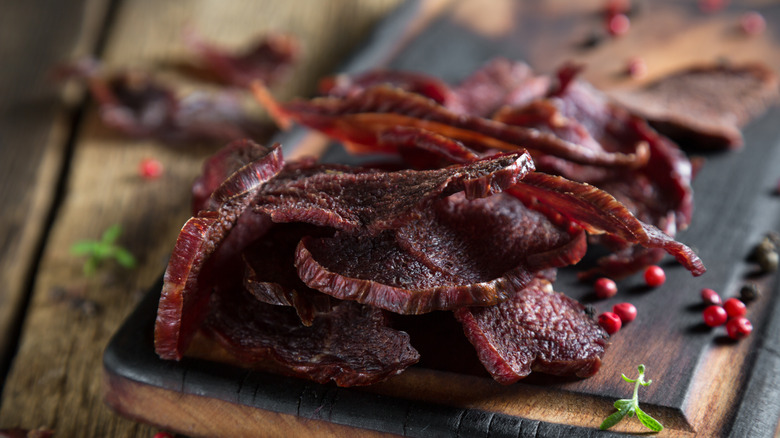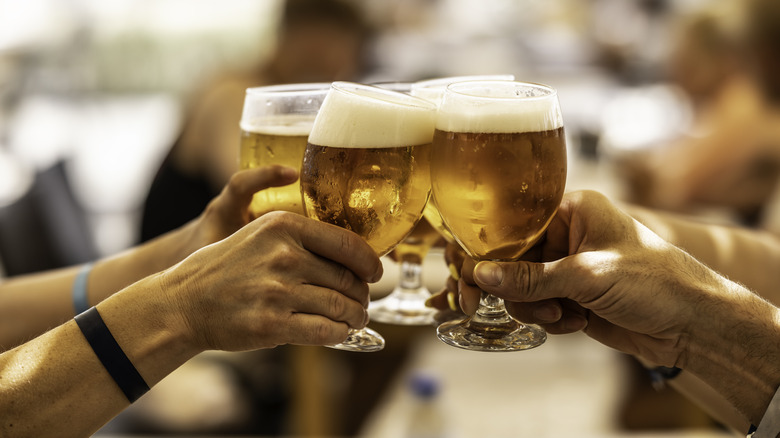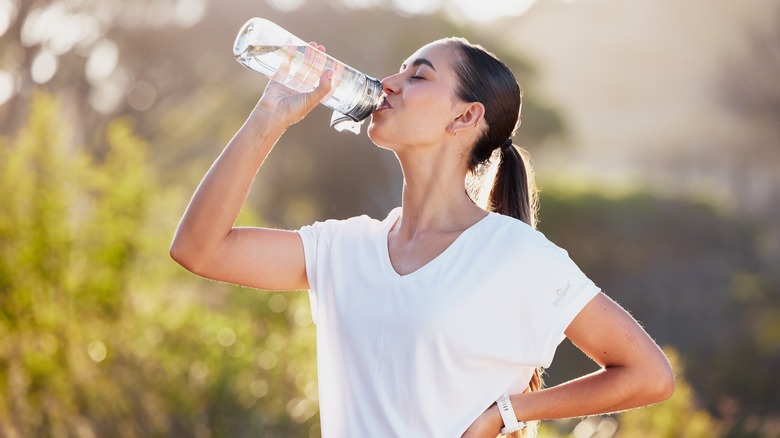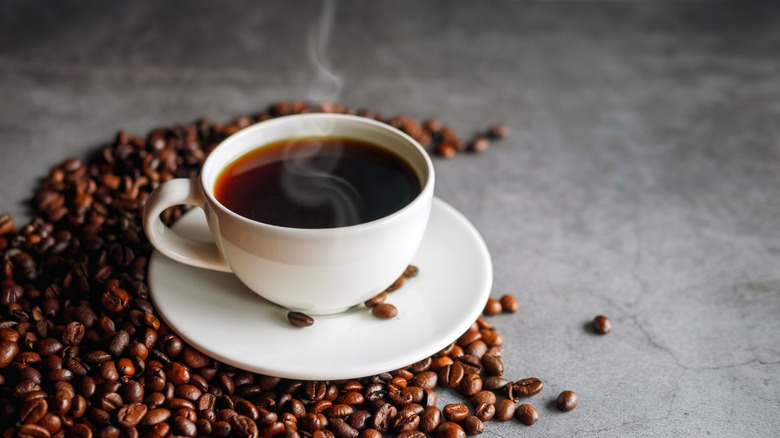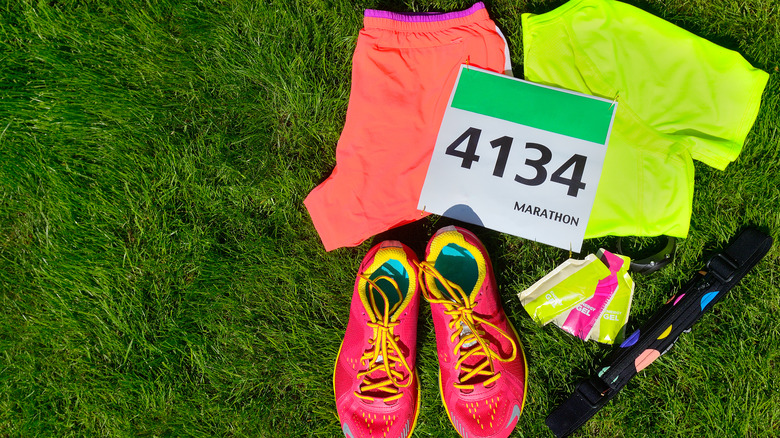A Chef's Guide To Eating Before A Marathon
We may receive a commission on purchases made from links.
We'll admit, we're not the kind of people that run for fun. But you, or someone out there that you know, might enjoy lacing up their running shoes, going for a long, pacing stride through the great outdoors, and achieving that endorphin-releasing runner's high. While running recreationally can be great for relieving stress and strengthening your body, other folks prefer to take a more competitive route and push their body to the limit. One of those people is Noah Poses, executive chef at The Fulton and current culinary director at the Creative Culinary Management Company. Besides being passionate about food, he's also a competitive runner; he will be completing the New York City Marathon in November 2024.
We had an opportunity to chat with Poses about how he fuels up for training and got his recommendations for how to eat and drink your way through a successful marathon. So lace up your running shoes, grab your racing bib, and let's go!
A protein-heavy diet can help you prepare for all types of physical activity
Food is fuel — and it's something that runners will know quite well. If you don't eat enough protein while you're training and preparing for your race, your body will not be able to build and recover your muscles. Not to mention, a diet that's lacking in protein may cause you to feel sluggish and slow, which is the opposite of what you need on race day. Carbohydrates and fats, the two other macronutrients, are important too — but protein is something that runners, and athletes as a whole, should be careful not to neglect.
"I eat a heavy protein diet and try to remain consistent with this overall, not just for running," says executive chef Noah Poses. Poses also shares that on busy mornings, he'll typically eat a protein bar or venison jerky. There are numerous brands of protein bars out there to try, including Barebells and Robert Irvine's FitCrunch bars, or you can turn to protein powder for a convenient way to get the macronutrient in. If you're looking to incorporate more protein into your regular diet, rather than turn to these supplements, think about lean meats, fish, legumes, and soy.
The exact amount of protein each individual needs per day will vary based on exercise intensity and weight, among other factors. The Utah State University Department of Extension recommends that endurance runners, including marathoners, eat 1.2 to 1.4 grams of protein per kilogram of body weight.
Don't drink alcohol too close to your race
You're running a big, big race — that's an occasion to celebrate! But you may want to think twice about celebrating with a glass (or two) of beer the night before any race, let alone a 26.2-mile marathon.
"Alcohol takes about five days to get fully out of your system, so if you are drinking, try to leave yourself a five-day buffer to allow your body to fully detox it out," says Noah Poses. Dr. Riva Rahl, preventive medicine physician at the Cooper Clinic, told Dallas Running Club that drinking before a race can decrease the amount of readily available energy (glucose) stored in your body, which can slow you down and impair your ability to run at your best. Moreover, excessive consumption of alcohol can impair healthy sleep habits, which doesn't spell "good news" before you run a race.
In short, you'll want to skip the bar crawl the night before your race, and stick to sipping water (or something non-alcoholic) instead. In the same interview with the Dallas Running Club, Dr. Rahl recommends avoiding the tempting post-race brew, too, as the level of dehydration you may experience, coupled with an adrenaline rush, may take a toll on your body and lead to even more negative health effects.
Hydrate in the days leading up to the race, not the morning of
Hydrate, hydrate, hydrate! It's something that anyone who regularly engages in fitness activities, which can include anything from running to weightlifting, should know. You have to give your body the opportunity to replenish all of those liquids lost from sweating and movement. Though, when it comes to hydrating, not all ingredients are created equal.
"You generally cannot beat water," says Noah Poses. "Make sure you are drinking a lot of water the night before the race to make sure you are hydrated ahead of [the event]." Poses adds electrolytes to his water to get the extra sodium, potassium, and other minerals. He stays away from Gatorade, which contains what he would consider a "high sugar content." Luckily, there are a ton of low-sugar electrolyte packs on the market, including Liquid I.V.
Like caloric and macronutrient intake, the amount of water you should consume will depend on the intensity of your exercise, your body's metrics, as well as how much you're perspiring. When deciding on how to hydrate, you should also consider when to hydrate. "You don't want to hydrate too much in the morning of the run to avoid using the bathroom a lot," says Poses. As you're running, you may also want to sip your water — rather than having to rely on aid stations to grab a cup along the way. A lightweight water bottle brand (which means leave your Stanley tumblers and YETI Ramblers at home) is easy to carry and will help you stay hydrated along the way.
Caffeine can be a dehydrator
"You mean to tell me I can't drink coffee before my marathon?" No, not necessarily — but if you want to be optimally hydrated before your race, you'll need to skip the Starbucks run. Noah Poses himself admits to drinking a double espresso each morning. But he refrains from drinking it before a race, as it can lead to dehydration. Poses goes on to explain that some gels contain a bit of caffeine, which can give you a little bit of a boost as you're running. His strategy is to use the uncaffeinated gels early on and slowly scale up to the caffeinated ones — if he needs them.
Despite Poses' recommendation, scientific studies have revealed that caffeine can provide certain benefits, including improved long-term endurance, decreased tiredness, and more. But with great benefit comes great consequences; drinking a lot of coffee can make your colon more active, which is far from what you want to happen the morning of your race.
Luckily, there are some coffee substitutes that you can enjoy. Some of them, like matcha tea and yerba mate, may even increase performance, as they're filled with antioxidants and compounds that aid in muscle recovery.
You may need to increase your overall calorie intake leading up to the race
We've already covered a little bit about what (and what not) to eat when you're running, but the amount of food you're eating can also affect your performance in the race. Generally speaking, the more calories you're burning, either through your metabolism or exercise, the more calories you need to eat. If you aren't eating enough, you may feel sluggish, tired, or put yourself at risk of losing muscle. "When you're running in general, you're burning calories and same for training, so it's good to have a higher intake during the moments you're most active," Noah Poses says.
Like all factors in the world of nutrition, the amount of calories you need is dependent on several different factors, including your weight, how often you're training, and how long you're going to be going without additional calories. Depending on your pace, you could be expending hundreds, and potentially over 1,000, calories per hour. Since the world of nutrition (and sports nutrition) can be rather complicated, we recommend seeing a registered dietician or sports medicine nutritionist to better help you calculate your caloric needs — both before and on race day.
Energy gels can help give you quick glucose as you're running
Energy gels or chews can be valuable for a long distance race. Noah Poses carries energy gels with him when he runs. "They're pretty easy to consume and I can tell a big difference in my energy levels when I don't take them," he says.
Energy gels are designed to quickly replenish carbohydrates as you're running. Runners Need estimates that this readily available carbohydrate, called glycogen, starts to deplete around halfway through your marathon pace — or at around 13 miles. The packets will have enough glycogen to get you through about 45 more minutes of running before you'll need to take another for the next 45. Unfortunately, you can't take two packets for a 90-minute interval, so be sure to pack a couple in your running pack for when the need hits.
You can find these packets at a number of stores. GU is a popular brand that comes in several different gluten-free or vegan flavors. The brand also makes energy chews, if you'd prefer something a little more toothsome.
Fuel up after your race, too
Fueling up after your race is just as important as preparing beforehand. The post-run meal is a critical point to replenish any lost electrolytes, water, and nutrients. One study published in Nutrients suggests that eating after a marathon is also important in muscle recovery and reducing tiredness over the following few days.
Noah Poses notes that he doesn't have a specific length of time that he waits to eat following a marathon; he just waits until he's hungry again. "I love to have a nice steak to celebrate and a good pasta," he says, noting that he also craves a "good salad" after a run. You'll also need to replenish those stores of glycogen with carbohydrates and grains. Consider a tasty and filling quinoa enchilada skillet, which contains a balanced amount of proteins, fats, and carbohydrates — and satisfies your craving for Mexican.
And even if you can't eat a whole meal after you run, you could always reach for a light snack — like a banana, peanut butter snacks, or a bagel — to fuel up and feel your best. Oh, and don't forget to get something tasty to celebrate — you deserve it!

